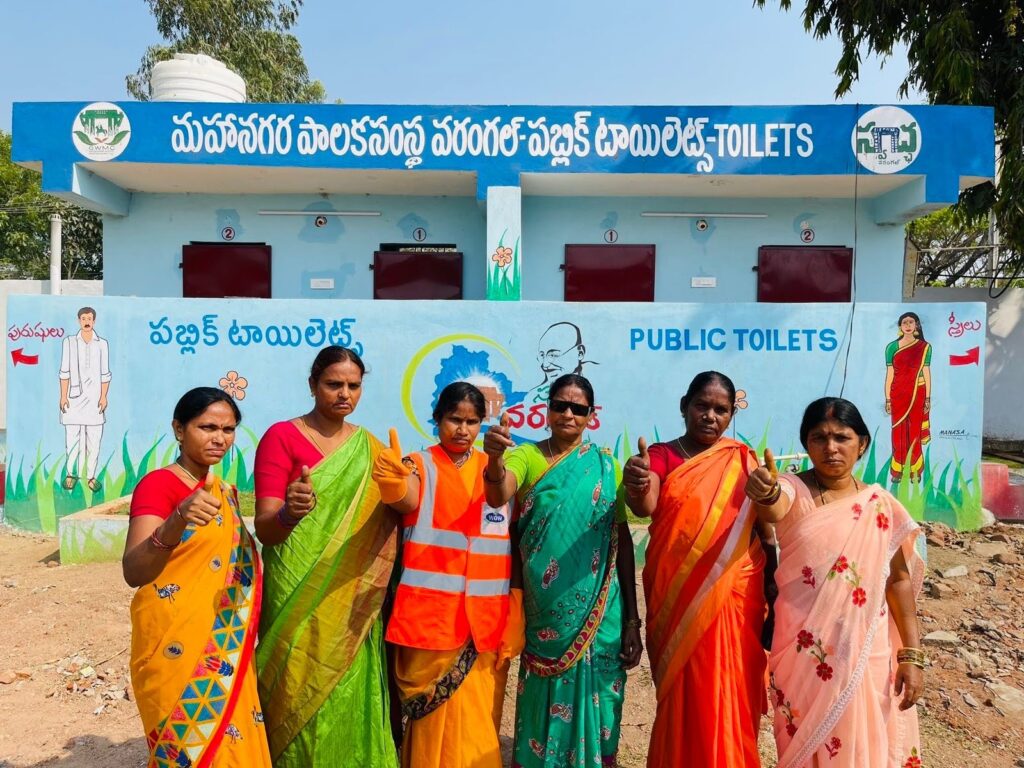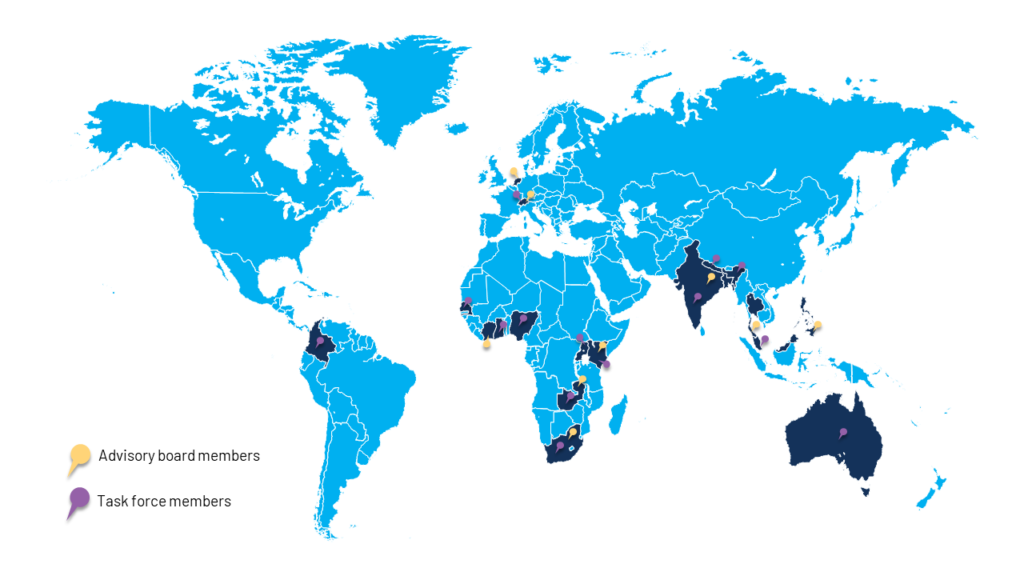IWA’s Inclusive Urban Sanitation initiative aims to reshape the global agenda on urban sanitation over the coming years. It forms part of IWA’s work to promote inclusive, resilient, water-wise and sanitation-secure cities. To further the aims of the initiative, IWA has launched a dedicated campaign – SanitAction – to gather the support and collaborative action needed to secure progress.
Far too many people in towns and cities around the world still lack access to safely managed sanitation. There is a need for an accelerated and inclusive approach to expanding safe service coverage. Importantly, this means looking beyond technology and the usual focus on building infrastructure. Inclusivity requires a holistic approach that tackles wider issues, especially the factors that allow sanitation services of all kinds to be accessed, managed, and delivered sustainably over time.
A central goal of IWA’s initiative will be to engage a wide range of stakeholders, not least the public sector, operators, academics, regulators and other key actors. Supported by this input, the initiative will build on current approaches to progress a widely applicable framework that can support elaboration and exchange on actionable guidance, case studies and peer exchanges and so advance inclusive urban sanitation, especially in low- and middle-income countries.
Actions to support development of this framework will involve assessment of existing tools and frameworks, securing worldwide endorsement to advance inclusive urban sanitation, and building awareness and skills, especially in the public sector responsible for creating the enabling environment for sanitation.
How to get involved
This initiative consists of a project team led by the IWA Secretariat as well as an Advisory Board and Task Force.
In addition, there are opportunities for IWA members to get involved and help shape the outcomes of this initative and contribute to its mission of achieving inclusive sanitation. IWA members can:
- Attend upcoming webinars from this initiative, more information will be posted in due course on the IWA Learn section of the website.
- Engage with the initiative on IWA Connect Plus where you can share knowledge, lessons learnt and insights on regulating for inclusive sanitation from different contexts
- Get in touch with one of the project team members based within the IWA Secretariat (Suresh Rohilla) if you are working on any similar projects or initiatives that have synergies with this initiative or likewise if you have any relevant case studies you wish to share with us.
- Submit your inclusive sanitation story! iwa-network.org/sanitation-stories/
- Join the discussion online using #SanitAction to promote inclusivity for resilient, water-wise, and sanitation-secure cities!
Inclusive Urban Sanitation Champions
The first edition of the Inclusive Urban Sanitation Champions received an overwhelming response, with a total of 106 submissions from 21 countries. An esteemed 13-member expert jury meticulously evaluated the submissions, recognising the outstanding efforts and initiatives that contribute to the advancement of sustainable and inclusive sanitation practices.
The programme features seven distinct categories, each spotlighting excellence and innovation in urban sanitation service provision. The selected IWA Inclusive Urban Sanitation Champions for 2023 are:
- IUS Champion for Service Delivery:
- Containment Systems: Fresh Life, Kenya
- Emptying and Transport Systems: Kampala Capital City Authority, Uganda
- Treatment Systems: Abdullah Al-Muyeed, Bangladesh
- Disposal and Reuse: Sinnar Municipal Council, Maharashtra, India
- IUS Champion for Communication: Tamil Nadu Urban Sanitation Support Programme, India
- IUS Champion for Youth Engagement: Global Sanitation Graduate School
- IUS Champion for Policy and Regulation: Lusaka Water Supply and Sanitation Company, Zambia
Inclusive Urban Sanitation Stories
The Inclusive Urban Sanitation stories are documenting some of the policies, practices, and approaches that demonstrate how stakeholders especially those in urban areas (e.g., public sector, operators, academics, regulators, and other key actors) are taking part or contributing to Sustainable Development Goal 6 which require water and sanitation concepts and norms to look beyond technology and the usual focus on building infrastructure. Increased focus is on safety, inclusion, environment, public health, and multiple technology solutions tailored to different geographies and socio-economic contexts for building climate-resilient cities. The stories aim to inspire urban stakeholders to discuss ways for advancing inclusive urban sanitation, especially in low- and middle-income countries
Submit your sanitation story!
To submit a story, kindly send an abstract of not more than 500 words to patrick.ronoh@iwahq.org. The abstract should contain the title, name of author(s), location, and subject of the story. As part of the submission, the abstract will undergo a review. The abstract that meets the criteria will be contacted to submit the full story.
Advisory Board and Taskforce
The initiative is supported by an Advisory Board and a Task Force to provide guidance, feedback and direction on the initiative’s priorities, activities and performance.
The advisory board and task force consist of sanitation experts, regulators, strategic partners and members from various global regions in order to secure a balanced geographical representation and address a wide variety of sanitation challenges.
Meet the Advisory Board
| Name | Organisation | Country |
| Patrick Ty | Manilla Metropolitan Waterworks and Sewerage System (MWSS) | Philippines |
| Mathi Vathanan | Housing and Urban Development Department (HUDD), State of Odisha | India |
| Jennifer Molwantwa | Water Research Commission | South Africa |
| Margaret Maina | Limuru Water and Sewerage Company (LWSC) | Kenya |
| Sylvain Usher | African Water Association (AfWA) | Côte d’Ivoire |
| Yvonne Magawa | Eastern and Southern Africa Water and Sanitation Regulators Association (ESAWAS) | Zambia |
| Kate Medlicott | World Health Organization (WHO) | Switzerland |
| Neeta Pokhrel | Asia Development Bank (ADB) | Philippines |
| Osward Mulenga Chanda | Africa Development Bank (AfDB) | Côte d’Ivoire |
| Thammarat Koottatep | Asia Institute of Technology (AIT) | Thailand |
| Damir Brdjanovic | Global Sanitation Graduate School (GSGS) | Netherlands |
Meet the Task Force
| Name | Organisation | Country |
| Diego Polania | Colombia Regulatory Agency (CRA) | Colombia |
| Hitesh Vaidya | National Institute of Urban Affairs (NIUA) | India |
| Sharmistha Debnath | Department of Public Health Engineering | Bangladesh |
| Shobana Srinivasan | Global Water Operators’ Partnerships Alliance | Germany |
| Recca Tharmarajah | National Water Services Commission (SPAN) | Malaysia |
| Allan Nkurunziza | Cabinet EDE International | Senegal |
| Beatrice Chibwe | Lusaka Water and Sanitation Company (LWSC) | Zambia |
| Priscillah Oluoch | Malindi Water and Sewerage Company | Kenya |
| Funke Adepoju | Lagos State Water Regulatory Commission | Nigeria |
| Jay Bhagwan | Water Research Commission (WRC) | South Africa |
| Ibra Sow | Pan-African Association of Sanitation Actors | Senegal |
| Aditi Dwivedi | CWAS – CEPT, University | India |
| Najib Lukooya Bateganya | Bill and Melinda Gates Foundation | USA |
| Hasin Jahan | WaterAid Bangladesh | Bangladesh |
| Annabell Waititu | Big Five Africa Ltd | Kenya |
| Srinivas Chary | Administrative Staff College of India (ASCI) | India |
| Abishek S. Narayan | EAWAG – Swiss Federal Institute of Aquatic Science and Technology | Switzerland |
| Kirsty Carden | University of Cape Town | South Africa |
| Charles Niwagaba | Makerere University | Uganda |
| Juliet Willetts | University of Technology Sydney | Australia |
| Srikanth Mutnuri | Birla Institute of Technology and Science – Pilani | India |
| Charlotte Akwaah-Adjei |
Ministry of Sanitation and Water Resources | Ghana |



